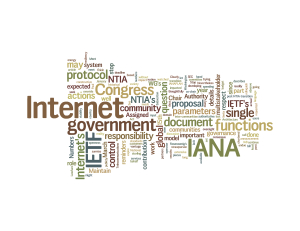The long-standing and generally-held belief of the Internet community has been that the Internet’s governance should be based on a “multistakeholder” model. Whatever you may surmise is the proper definition of that word, we should readily agree it doesn’t mean that a single government, any single government, should have override control of major swaths of the Internet or its support functions.
This year, there have been constructive community steps towards reducing the Internet’s dependency on a single nation, as well as a variety of reminders why it is important to make that effort successful.
Hence the global satisfaction at the NTIA’s announcement in March 2014 that it would seek a multistakeholder-model-supporting proposal to transition the NTIA (and the US government) out of its oversight role for the Internet Assigned Numbers Authority (IANA). For many, this has been a long time coming — certainly, the Internet Architecture Board, on behalf of the IETF, has been signalling (to the NTIA, publicly) its concerns about the IETF’s lack of control over its own standards’ parameter assignment since at least the days when I was the IAB Chair.
The communities that have actual responsibility for managing the names, numbers, and other protocol parameters have, since March, stepped up to engage in developing the pieces of the requested proposal. These are not random strawperson proposals to define a new Internet or governance system: the communities involved are dependent on the IANA function for getting their own work done, and the focus has been on ensuring that the Internet’s naming, numbering and protocol development functions will continue to work reliably, responsibly and without undue interference in a post-NTIA-transition world.
For the protocol parameters part of IANA, the IETF’s IANAPLAN working group was chartered “to produce an IETF consensus document that describes the expected interaction between the IETF and the operator of IETF protocol parameters registries.” From my vantage point as co-chair of the WG, I have seen the WG’s extensive discussion of the issues at hand, and watched the document editors do a sterling job of producing a document that will be the basis of the IETF’s contribution to the proposal. With the WG’s document in last call across the IETF until the 15th of December (err, today!), the IETF is on track to have its contribution done by the January 15th deadline set by the inter-communittee coordinating committee. (See IETF Chair Jari Arkko’s blog post for more details).
Just in case anyone’s energy was flagging before we finish the final details, there are timely reminders of why it is important to keep pressing on with defining (and realizing) the IANA in a post-NTIA reality. As noted in Paul Rosenzweig’s article on Lawfare, “Congress Tries To Stop the IANA Transition — But Does It?”, a different part of the US government (the US Congress) is trying to stop the NTIA’s actions:
“Now Congress has intervened. In the Omnibus spending bill that looks to be going through Congress this week the following language appears:
SEC. 540. (a) None of the funds made available by this Act may be used to relinquish the responsibility of the National Telecommunications and Information Administration during fiscal year 2015 with respect to Internet domain name system functions, including responsibility with respect to the authoritative root zone file and the Internet Assigned Numbers Authority functions.
(b) Subsection (a) of this section shall expire on September 30, 2015.”
Rosenzweig goes on to observe that the provision may well not have the expected impact, and might have more deleterious effects for the US. Perhaps this is Congress attempting to use the budget process to stop the NTIA’s actions in their tracks; perhaps it’s just budget-jockeying on a scale not comprehended outside the limits of Washington, D.C. But — It.Doesn’t.Matter.
Most of the Internet’s users do not live in the country in question, let alone have a voice in those discussions. Nevertheless, they are impacted by the outcome. Which is why the Internet community, which is global, and has solicited input broadly, is stepping up to create a future for the IANA that will:
- Support and enhance the multistakeholder model;
- Maintain the security, stability, and resiliency of the Internet DNS;
- Meet the needs and expectation of the global customers and partners of the IANA services; and,
- Maintain the openness of the Internet.
Clearly, that can not be satisfied with the control of any single government, as the US Congress’s actions remind us now! The question is not whether the US government retains its historical role as contract-holder for the IANA functions. The question is how to best meet the criteria thoughtfully laid out by the NTIA.

